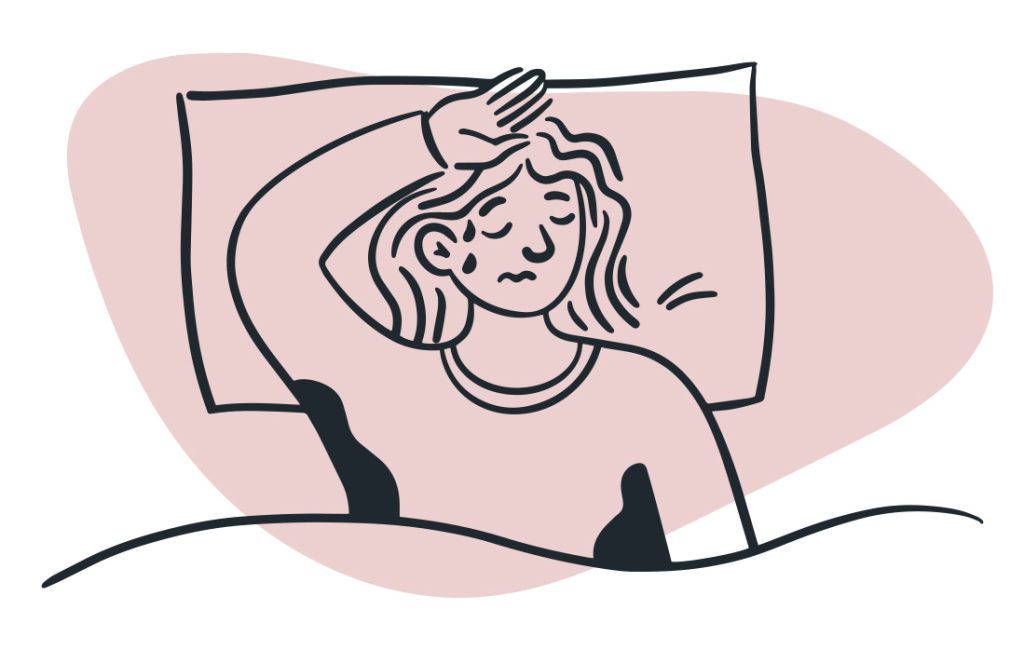Keep It Cool: Tips To Not Sleep Hot
Disclosure: By clicking on the product links in this article, Mattress Nerd may receive a commission fee at no cost to you, the reader. Read full disclosure statement.
If you run hot at night, you might have a tough time falling asleep or you might wake up in the middle of the night sweating bullets. Either way, being overheated in bed can keep you from getting the rest you need.
Let’s dive into why you get so hot while sleeping and the best temperature for sleep for adults, babies, and seniors.

Why Do I Get So Hot While Sleeping?
There are lots of reasons why you might sleep hot at night. Some common causes are:
- Heat retention
- Hot seasons
- Menopause & sex hormones
- Hyperthyroidism
- Diabetes
- Medications
- Infections or illness
Here’s an overview of each potential problem.
Heat Retention
When the heat leaves your body, it can disperse into your sheets, blankets, pillows, and mattress, all of which can retain that heat. This is especially true for high-thread-count sheets or other fabrics that don’t breathe well.
Instead of heavy fabrics like wool, opt for these lighter options:
Hot Seasons
Your core body temperature drops at night, usually about 1 to 2 degrees. This might not seem like a lot, but it can make a big difference. It’s a way you body lets you know it’s time to go to sleep.
A cool room can help make this happen. That said, it might be harder to fall asleep during warmer seasons.
Menopause & Sex Hormones
Hormonal imbalances can lead to an uptick in sleep sweats or hot flashes. It’s a common symptom of menopause but can also happen during certain stages of the menstrual cycle.
Many people who get periods feel hot at night due to fluctuations in progesterone and estrogen levels. The hormonal changes during pregnancy can also raise the core body temperature and increase blood flow.
Hyperthyroidism
Hyperthyroidism is a condition that happens when the thyroid produces too much thyroxine hormone. It can cause effects that mimic menopause symptoms. This includes:
- Insomnia
- Sweating
- Hot flashes
- Heat sensitivity
- Short bursts of heart palpitations
- Tachycardia (persistent rapid heartbeat)
Diabetes
People who have type 1 or type 2 diabetes tend to be more sensitive to heat than those who don’t. According to the Centers for Disease Control and Prevention (CDC), certain diabetes complications – like damage to nerves and blood vessels – can affect the sweat glands. This can make it harder for the body to cool as effectively.
Additionally, studies show that people with diabetes may have reduced sweat responses when exposed to heat. This can have an impact on glycemic control and cardiovascular regulation.
Medications
According to the National Health Service, certain medications can make you overheat at night. Common culprits include:
- Diuretics
- Certain diabetes medications
- Hormone therapy medications
- SSRI or tricyclic antidepressants
- Steroids like prednisone or cortisone
- Painkillers like aspirin or acetaminophen (Tylenol)
- Certain high blood pressure medications (like Methyldopa)
Infections or illness
Many sicknesses can increase your body temperature, leading to hot, sweaty nights tossing and turning in bed. If you’re fighting an illness or infection (like the flu or strep throat) talk with your doctor about to address this cause in order to get your best rest.
Best Temperature For Sleep
The best temperature for sleep varies from person-to-person. Here’s a rundown of the best sleep temperatures based on a person’s age.
Best Temperature For Baby Sleep
Babies can’t regulate their body temperature as well as adults. It also takes time for infants to develop a regulated sleep cycle. They don’t establish circadian rhythms until about 12 weeks of age and require much more sleep than adults.
With all of that in mind, be sure to keep a baby’s room cool and comfortable. Experts recommend a temperature between 68 and 72 degrees.
Best Sleeping Temperature For Adults
According to a 2019 study, the optimal sleep temperature is about 66 to 70 degrees. Meanwhile, the CDC suggests adults sleep in a room that’s 65 to 68 degrees.
Why keep your bedroom cool? Sleeping at a cool temperature can benefit REM sleep and may help you feel more rested in the morning.
Best Sleeping Temperature For Seniors
Seniors may want to sleep at a slightly higher temperature than younger adults (about 68 to 70 degrees). Older people are at a higher risk of hypothermia, and a lower room temperature can increase the risk.
Try sleeping with socks and a warm hat on your head if you get cold at night. It can help your body retain more heat.

Tips To Stay Cool At Night
- Wear breathable clothing. Tight-fighting pajamas can trap excess heat and hot air against your body. Opt for loose-fitting, breathable clothes instead.
- Get a cool pillow or mattress. Some modern memory foam pillows and mattresses offer cooling technology, allowing for better air circulation. Keep in mind that they might not work as well if you use heat-retaining pillowcases, comforters, or bedding.
- Stay hydrated. Drink a glass of cold water an hour at bedtime. This can lower your core body temperature before sleep. You can also keep a cup of cool water close to your bed in case you get thirsty at night.
- Get a cooling fan. Air conditioners aren’t for everyone. Plus, they can be super spendy. You can get a cooling fan or mini-AC unit if central air isn’t your thing.
- Get heat-blocking window shades. Honeycomb or cellular shades are great at locking heat into your room in the winter. But they’re equally effective at keeping your bedroom cool in warmer months. Blackout curtains are also a good choice – they block out hot sunlight and keep your room dark.
- Avoid alcohol, caffeine, and spicy foods before bed. These foods and drinks can increase your body temperature, making you feel sweaty or even feverish. Generally, limiting these items to at least 3 hours before you want to sleep is best.
- Use ice. Apply an ice pack or cold compress to your forehead before bed. It feels good on your lower back or neck. Wrap it with a washcloth.
- Turn down your thermostat. Keep your thermostat at a cooler temperature at night and raise it to a higher temperature in the morning.
- Take a cool shower before bed. A cool or lukewarm shower can help lower your body temperature before bed. Plus, taking a shower at night might help you feel relaxed, which might help you doze off faster.
- Try a meditation exercise. Practicing meditation or breathing exercises before bed can help lower your heart rate, which in turn can reduce your body temperature.
Final Thoughts
Being overheated or sweaty can lead to a stormy night’s sleep. In general, try to keep your bedroom at 65 to 68 degrees for optimal comfort. Folks that may have a harder time regulating their body temperature should set their thermostat closer to 68 to 72 degrees.
Wearing breathable clothing, getting a cooling pillow, or avoiding alcohol before bed can also help keep things cool.
Sources
- Garzon DL, et al. (2020). Burns’ Pediatric Primary Care E-Book. https://books.google.com/books?id=4TC-DwAAQBAJ&pg=PA90&lpg=PA90&dq#v=onepage&q&f=false
- Harding EC, et al. (2019). The Temperature Dependence of Sleep. https://www.ncbi.nlm.nih.gov/pmc/articles/PMC6491889/
- Improve Sleep: Tips to Improve Your Sleep When Times Are Tough. (2020). https://blogs.cdc.gov/niosh-science-blog/2020/06/29/sleep-hwd/
- Is It Menopause or a Thyroid Problem? (n.d.). https://www.menopause.org/for-women/menopauseflashes/menopause-symptoms-and-treatments/is-it-menopause-or-a-thyroid-problem
- Keeping Your Baby Warm. (n.d.). https://www.urmc.rochester.edu/encyclopedia/content.aspx?contenttypeid=90&contentid=P02425
- Kenny GP, et al. (2016). Body Temperature Regulation in Diabetes. https://www.ncbi.nlm.nih.gov/pmc/articles/PMC4861190/
- Managing Diabetes in the Heat. (2022). https://www.cdc.gov/diabetes/library/features/manage-diabetes-heat.html#
- Night sweats. (2021). https://www.nhs.uk/conditions/night-sweats/
- Okamoto-Mizuno K, et al. (2012). Effects of Thermal Environment on Sleep and Circadian Rhythms. https://www.ncbi.nlm.nih.gov/pmc/articles/PMC3427038/
- Tham E, et al. (2017). Infant Sleep and its Relation with Cognition and Growth: A Narrative Review. https://www.ncbi.nlm.nih.gov/pmc/articles/PMC5440010/


